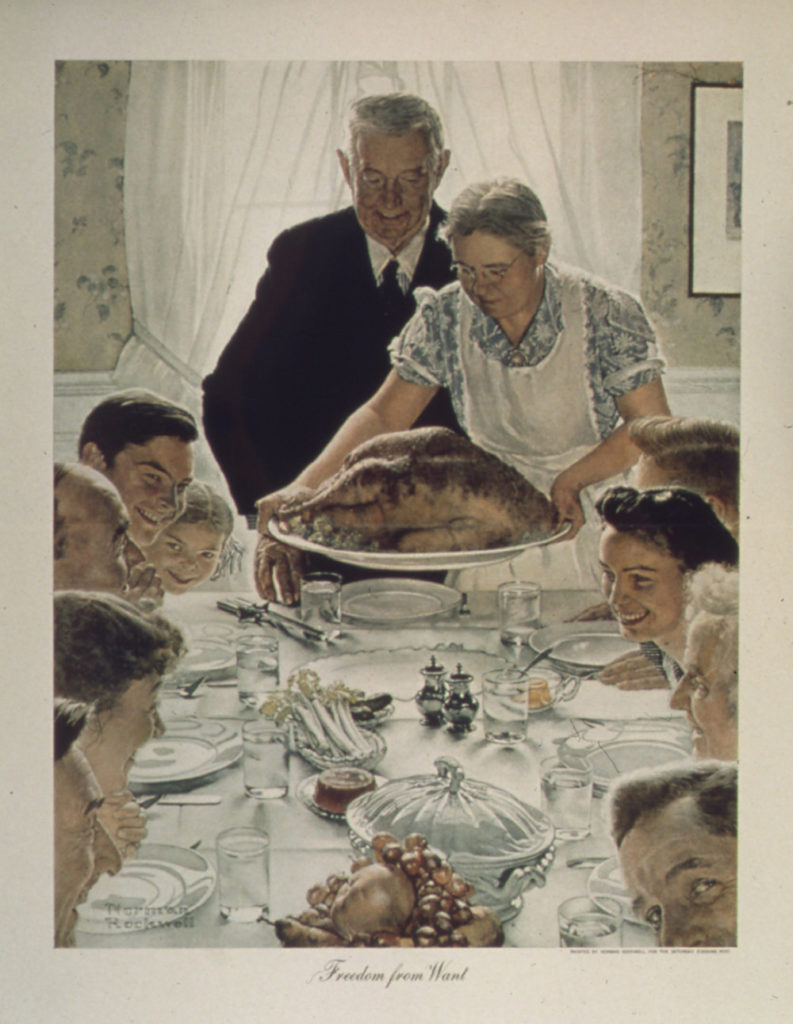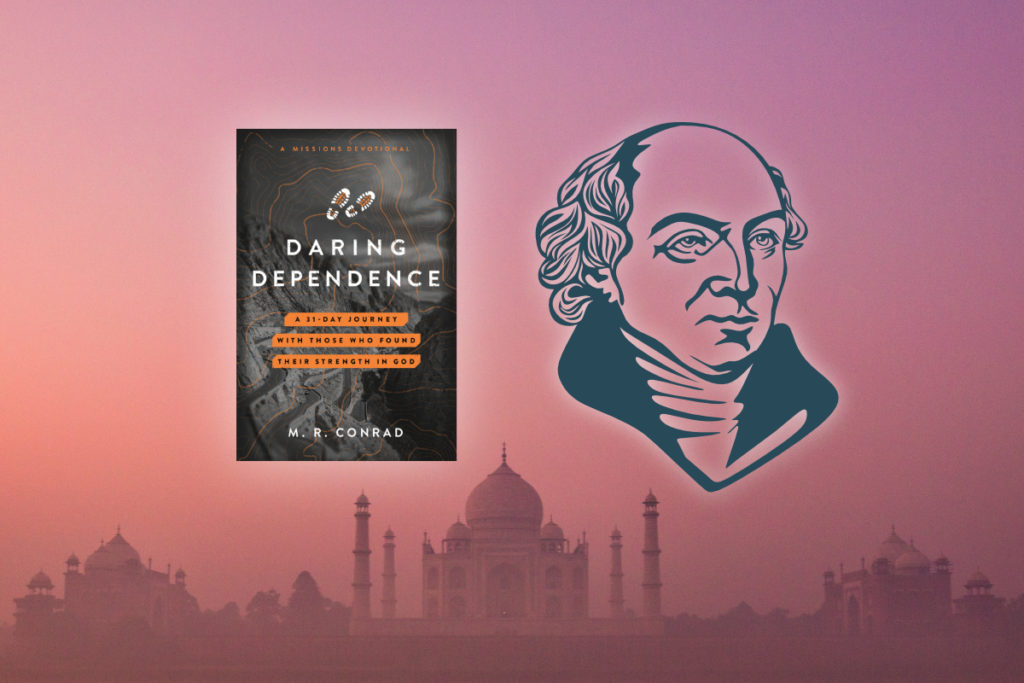Take a mental Thanksgiving snapshot. What does it look like? For me, it’s a cornucopia overflowing with vegetables (although I’m an unabashed carnivore). It’s the Macy’s Thanksgiving Day Parade, complete with its giant, inflatable, pilgrim-duds-wearing turkey. It’s NFL games featuring the Lions and Cowboys, always. It’s family and way too much food, both of which are captured vividly in Norman Rockwell’s iconic painting “Freedom from Want.” (Give it up for Grandma, who is effortlessly curling that giant turkey platter, as if it’s inflatable.)

Thanksgiving 2020 feels different. The world is quarantined, and family gatherings are being discouraged. Parades and football games are still happening, but sans any live audience. More importantly, many are jobless this Thanksgiving. Several friends are grieving loved ones lost to COVID. My own mother is in the hospital fighting a harrowing battle with COVID. She almost certainly will spend Thanksgiving there. Alone.
Our praise and thanksgiving should be unconditional
Yet, I suggest that Thanksgiving is more important this year than ever in my lifetime. It’s good to be grateful for physical blessings, like health, provision, and even abundance. All of those gifts come to us from a generous and changeless Father (James 1:17). Still, our praise and thanksgiving should be unconditional. In my own meditations, Philippians 4:4–13 have been a timely reminder that Christians don’t live “under the circumstances.” Read the text, then consider with me the following talking points:
1. You can have the joy of the Lord, always (v. 4). Throughout the book of Philippians Paul calls Christians to joy. Our joy, he says, is “in the Lord.” That’s not a pious-sounding flourish. Rather, it’s the secret of true, enduring, no-matter-what joy. If your joy (so-called) depends on your circumstances, it will be arbitrary and fleeting. If your joy comes from your relationship with the Lord, it will be dauntless and enduring. Remember: “Joy is as constant as its cause.”
2. You can show reasonableness as part of your Christian testimony (v. 5). All too often, especially in recent months, Christians are known for being agitated by political and social unrest, for promoting conspiracy theories, and for bellowing our frustrations on Facebook. But Christian contrarians are blowing their testimonies “before all.” Paul calls us—even in challenging times—to be noted for our “reasonableness.” The KJV calls it “moderation.” Other synonyms include forbearance and graciousness. You don’t have to be a crank—not in private, but especially not in public. Paul underlines this command with “the Lord is at hand,” which sounds less like “Everything will be fine, Dear” and more like “Wait until your Father gets home!”
3. You can know the peace of God instead of anxiety (vv. 6-7). In these well-known verses we are given two options: worry (which is sinful and senseless, as it accomplishes nothing) or prayer (which unleashes both God’s power and God’s peace). Tough choice, eh? Panic or peace. Too many Christians worry as a way of life, grinding their gears, murmuring (or cursing) under their breath, and basically giving themselves and everyone around them ulcers. It needn’t be that way. It mustn’t be that way. Pray. Pray with requests. Pray with thanksgiving. Then enjoy God’s too-good-to-make-sense peace.
4. You can exercise control over what you think and do by God’s grace (vv. 8-9). Paul next tells us to “think on these things” and “practice these things.” Paul commands us how to think and behave. That’s significant! Contrary to your experience, you don’t have to live at the mercy of your runaway thoughts. You can determine what to think about, by God’s grace. Paul doesn’t challenge you to think of “raindrops on roses and whiskers on kittens” so you “don’t feel so bad.” This isn’t positivity or Pollyanna. Rather, he commands you to think Christian thoughts. Biblical thoughts. He tells you to fill your mind with Gospel Meditations (which, alas, sounds too much like an advertisement, I know. All rights reserved.). And go beyond thinking right thoughts; act on them. The result? Even in prison you will experience the peace of God (v. 7) as you enjoy the God of peace (v. 9).
5. You can learn contentment in times of plenty and times of want (vv. 10-13). That verb was chosen on purpose: twice Paul says he himself “learned” contentment. It’s not natural, but it’s essential. I define contentment as “being satisfied with the circumstances God has ordained for me and the possessions God has provided for me.” Its opposite is covetousness. If that’s not convicting enough (especially in 2020, when we’re all prone to discontentment), Scripture roots our satisfaction with our circumstances and provisions in our satisfaction with God. Hebrews 13:5 says to “be content with what you have” for one simple reason: Jesus has promised, “I will never leave you nor forsake you.” That should be enough. Discontentment is dissatisfaction with God.
These commands are backed by divine power
These commands are TOUGH! Thankfully, they are backed by divine power. They are possible because the gospel has changed everything about our lives, including not only our standing but our very nature and outlook. They are possible because Christians are indwelt and empowered by the Spirit. And they are ultimately possible because of Philippians 4:13, which is easily the most twisted verse in Scripture: “I can do all things through Christ who strengthens me.” In context, he’s not saying you can run a marathon, climb a mountain, or win a weight-loss challenge. He’s saying you can sit in prison, bereft of every comfort, and say “I shall not want.” You can look at a world of devastation and rejoice in the Lord (a la Habakkuk 3:17-18).
God’s power allows you to endure an empty cornucopia and some empty chairs around the table with joy, with peace, and yes, with thanksgiving. I’m praying you will. Pray I will. Grace.
Let the gospel determine your attitude, especially in hard times.













